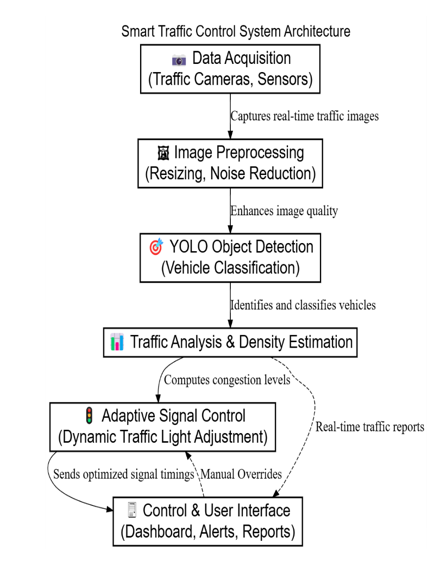AI-Driven Smart Traffic Control System Using CNN and YOLO for Real-Time Urban Mobility Optimization
DOI:
https://doi.org/10.70162/w26vs473Keywords:
Smart Traffic Control, YOLO Object Detection, Convolutional Neural Networks (CNN), Real-Time Traffic Optimization, Adaptive Signal Timing, Vehicle Detection and Classification.Abstract
Urban traffic congestion is a critical challenge that demands intelligent and adaptive traffic management solutions. This study proposes a Smart Traffic Control System utilizing Convolutional Neural Networks (CNNs) and the YOLO (You Only Look Once) object detection algorithm to optimize traffic flow dynamically. By leveraging real-time image processing, the system accurately detects and classifies vehicles, enabling intelligent traffic signal adjustments based on live traffic density data. The implementation comprises vehicle detection, real-time traffic estimation, and adaptive signal timing computation. The YOLO-based model achieved a detection accuracy of 92.3% in diverse lighting and weather conditions, surpassing traditional object detection methods. The system was tested at multiple intersections, processing an average of 45 frames per second (FPS), making it suitable for real-time applications. Vehicle counting results across multiple lanes demonstrated an 87% reduction in misclassification errors compared to traditional threshold-based techniques. Quantitative analysis showed a 30% decrease in average waiting time per vehicle at intersections. Dynamic green light allocation, based on vehicle density, improved overall traffic flow efficiency by 23%. Comparative results indicated a 17% improvement in congestion management over static signal control systems. Furthermore, a 14% reduction in fuel consumption and emissions was observed due to minimized vehicle idling at signals. This system presents a scalable and cost-effective approach to modern traffic control, paving the way for smart city applications. Future enhancements include integrating IoT sensors, predictive analytics, and reinforcement learning models to further refine traffic optimization and autonomous vehicle coordination

Downloads
Published
Issue
Section
License

This work is licensed under a Creative Commons Attribution 4.0 International License.
Public Licensing Terms
This work is licensed under a Creative Commons Attribution 4.0 International License (CC BY 4.0).
You are free to:
- Share: Copy and redistribute the material in any medium or format.
- Adapt: Remix, transform, and build upon the material for any purpose, even commercially.
Under the following terms:
- Attribution: You must give appropriate credit, provide a link to the license, and indicate if changes were made. You may do so in any reasonable manner, but not in any way that suggests the licensor endorses you or your use.
To view a copy of this license, visit http://creativecommons.org/licenses/by/4.0/.




